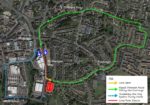As reported last week, engineers are currently investigating ground conditions at the site of the partially collapsed retaining wall in Belgrave Road, Ventnor.
The retaining wall along Belgrave Road started to collapse in January last year. It led to the road being closed, as the road surface started to fall away, and has been open for pedestrian access only (excluding the current closure for the investigative works) ever since.
Detail of investigations
News OnTheWight put a number of questions to Island Roads to help readers understand the work that’s taking place. It took a week, but the responses came back yesterday.
Q: Are the engineers taking soil or rock samples for lab testing. If so, how deep are they going?
Yes, they are taking a series of soil and rock core samples for identification and testing.
These samples will be to a depth of up to 15 metres.
Q: What are they measuring?
This work will reveal the rock formations and composition of the ground in this part of Ventnor.
The information will help us establish a greater understanding of the ground conditions at the site which will help the process of designing a solution to enable the re-opening of Belgrave Road.
Q: Are they using a cone penetrometer or a piezometer?
The holes are being drilled using a specialist rotary coring rig. Piezometers are being installed in selected boreholes to establish and monitor groundwater levels in the ground.
Borehole inclinometers are also being installed in selected boreholes to monitor ground behaviour.
Cone penetration testing is not suitable in these ground conditions as this technique cannot penetrate rock.
Q: Is this the only borehole?
No. There will be five rotary cored boreholes at this location (Belgrave Road and Esplanade Road) and some trial pits and hand driven boreholes in the less accessible terrace areas.



